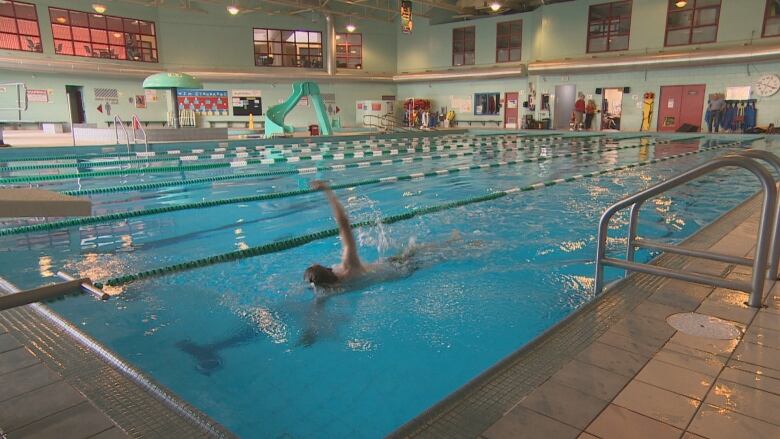Para-swimmer says age, disability discrimination keeps him from competitions
Swimming Canada, Swim Nova Scotia deny Danial Murphy's discrimination allegation

A para-swimmer in Halifax says he's been unable to enter competitions for nearly a year due to discrimination based on his age and disability, an allegation strongly denied by both Swimming Canada and Swim Nova Scotia.
"I felt pretty let down … because all I wanted to do was swim, and do my thing, and to be able to do the thing I love," said 30-year-old Danial Murphy, who has been a competitive para-swimmer since he was 12.
Murphy has cerebral palsy and hemiplegia, meaning he has limited movement on his whole right side.
He won a bronze medal at the ParaPan-Am Games in Toronto in 2015, placed 15th in the 200-metre freestyle event at the 2016 Paralympic Games in Rio de Janeiro, and holds dozens of medals from national para-swimming competitions.
But for the past 11 months, Murphy has been unable to attend competitions.
That's because he couldn't find a swimming club in Halifax to accept him as a member, which is a requirement to register in high-level tournaments.
Rejected 7 times
Murphy said he asked to join the clubs' competitive para-swimming programs.
But after some initial failures, Murphy started applying to be an affiliate club member, providing his own coach and independent pool time.

Murphy said his applications to seven swimming clubs were rejected, citing reasons such as burdensome paperwork or differences in coaching philosophies.
"I felt pretty upset about it because … I swam for 17 years. There was never nothing ever said that I was too much work."
Tireless in the pool
Kevin Ross has more than 40 years experience as a swim coach in Nova Scotia, working with both para-swimmers and able-bodied athletes.
He worked with Murphy when he was on the coaching staff at the Sackville Sports Stadium.

Now in retirement, he's continuing to coach Murphy one-on-one as a volunteer, training together seven times a week in the pool, with two additional dry-land fitness sessions.
"I call him the Eveready Rabbit. He just goes and goes and goes and goes. I've never had a question about getting Danial to work hard," Ross said. "It's an absolute pleasure."
A coach's perspective
Ross believes that Murphy's challenges are made worse by complex athletic regulations, liability concerns, and a shortage of pool time in Halifax.
But he believes the club system as a whole is excluding para-swimmers.
"I mean, every club right now is out recruiting swimmers. So what are they recruiting? They say they'll take para-swimmers. But they're not," Ross said.
Ross said Murphy doesn't fit easily into traditional club schedules, because he's slower than able-bodied adults, but too old to swim with children.
"So it's age discrimination, disability discrimination, all sorts of things," Ross said.
Importance of inclusion
Murphy grew up swimming in the same practices as competitive able-bodied swimmers. He'd do the same exercises, but cover less distance.
Murphy said this practice is no longer standard; now, para-swimmers typically swim separately after the able-bodied teams. He's grateful he didn't face that isolation from his able-bodied teammates.

"We would go to movies and different events … We would do stuff like mini golf and stuff like that," he said. "They never saw me for the disability. They just saw me as a friend."
A new chance
Murphy missed this year's national para-swimming competitions and his chance to qualify for the Worlds, scheduled for September in the U.K.
But he now has a lifeline. He's been tentatively accepted as a member of the Canada Games Centre Swim Academy in Halifax, which would allow him to register for competitions once again.
"It's still pending, but I would like to thank them for allowing me to register with them and move forward," Murphy said.
'Unreasonable restrictions'
In an email, Swimming Canada said it's been following Murphy's quest to find a team and doing everything it can to support it.
"Swim Nova Scotia acted appropriately and there is nothing else additional that could be done to address the unreasonable restrictions requested by the family," said Brian Edey, operations manager for Swimming Canada.
Edey said the request for coach Kevin Ross to join a team's staff, even as a volunteer, is not appropriate.
"Given the same set of circumstances we believe this situation would have been the same if Danial was an able-bodied swimmer. Athletes cannot force clubs to hire coaches," he said.

Edey said there are other issues that Swimming Canada can't divulge for privacy reasons.
"Based on the information we have, we don't see any indication of discrimination. The rejections were due to issues the family has not shared with CBC," he said.
Ebey offered to discuss the issue in full if CBC could obtain a "full release of liability" from the Murphy family and Ross.
"We have followed policy and procedure and the system worked here. We will continue to make every effort to provide a safe environment for all swimmers, coaches and clubs." he said.
Murphy remains certain his 11-month competitive hiatus is due to a lack of inclusivity.
"They have to be inclusive to everyone who approaches them. And they're not," he said. "I don't think it would have happened to an able-bodied swimmer."

